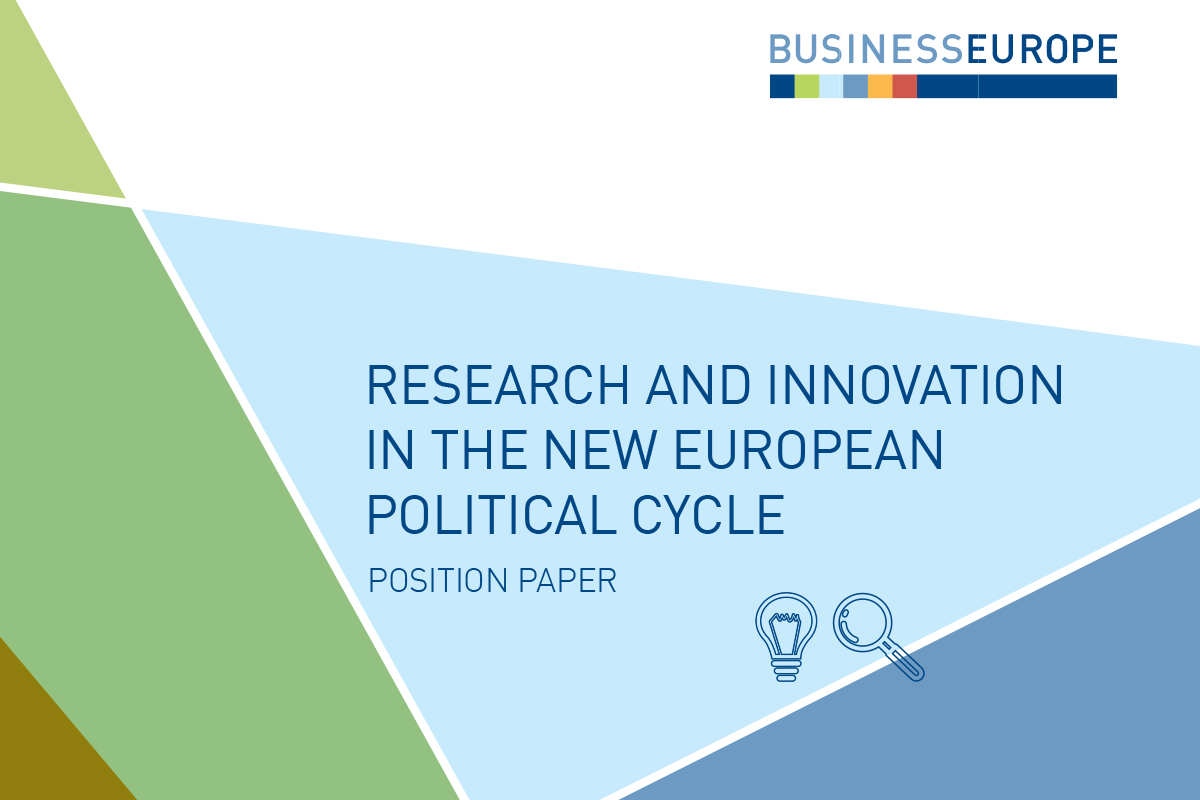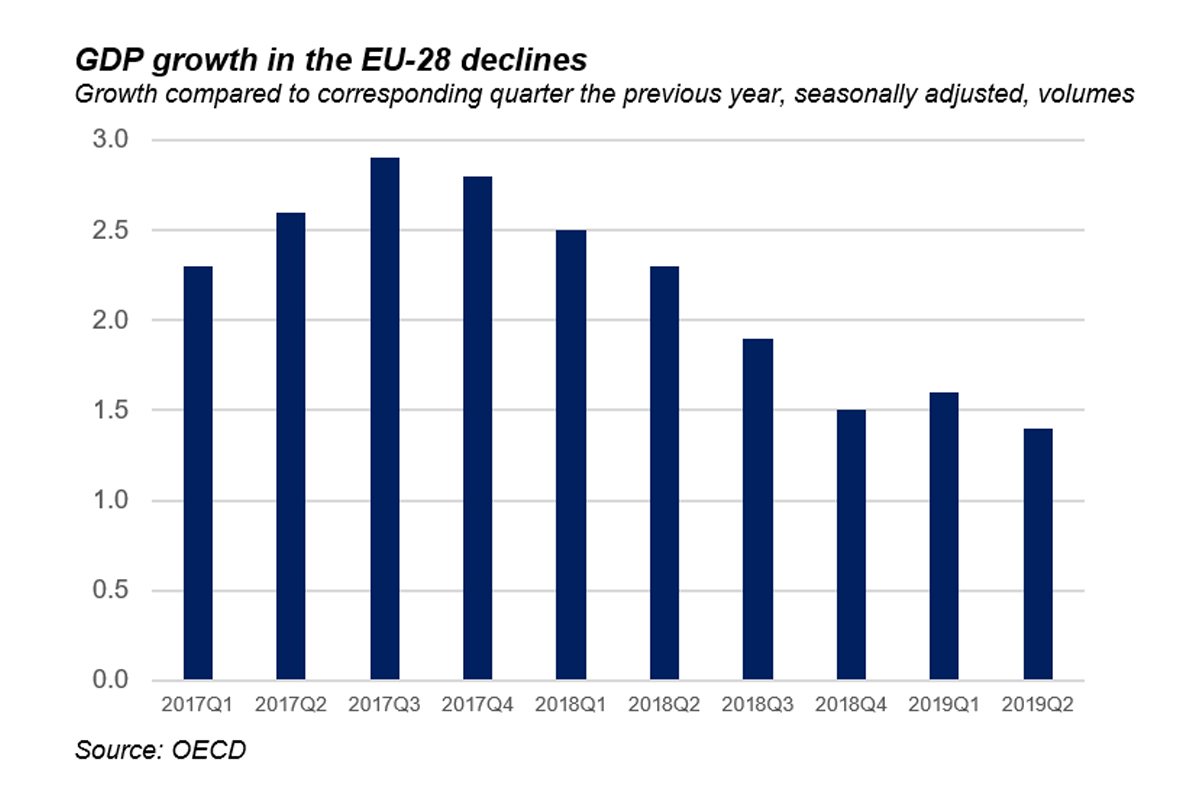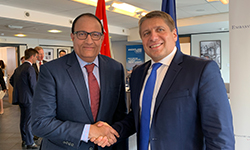BusinessEurope Headlines No. 2019-27
30 actions to boost research and innovation in Europe

Today, BusinessEurope presented its new strategy paper for EU research and innovation (R&I), setting out 30 concrete policy measures for the new EU political agenda. As the global innovation race accelerates with fierce competition for new R&I investments, Europe needs to move forward in the following four priority fields: i) more and smart public investments; ii) “fit for innovation” regulations, iii) skilled people, iv) enhanced collaboration. Our 30 policy recommendations can turn ambition into reality. See the publication.
![]() Contact: Carolina Vigo
Contact: Carolina Vigo
Video message on why research & innovation matter: the SME perspective
BioPhero wants to lead the global transition towards sustainable agriculture. Watch this video to understand the importance of research and innovation and Horizon Europe funds for a technology-intensive SME.
Our comment
Signs of a slowdown reinforce need for structural reforms
By Malthe Munkøe, Senior Adviser, Economics Department
BusinessEurope released its latest Economic Outlook in June where we forecasted 1.6% GDP growth for the EU-28 in 2019. We noted that growth was faltering and that structural reforms to increase competitiveness were needed to keep growth on track. Since then, economic conditions have worsened considerably, further reinforcing the need for structural reforms:
- The German economy has done substantially worse than expected and entered recession territory in the second quarter of 2019 with -0.1% quarter-to-quarter GDP growth. The IFO Business Climate Indicator, which combines an estimate of the current situation and a forward look at the coming six months, has plunged to a 7-year low.
- Although the political turmoil in Italy has now subdued, we still forecast zero economic growth in line with our June forecast.
- While relatively high growth continues in many EU member states, for example in Spain (+0.5% quarter-to-quarter growth in 2019Q2), Poland (+0.8% in 2019Q2) and Denmark (+0.8% in 2019Q2), trade tensions have worsened, leading to a general deterioration of the economic situation in Europe.
Following these developments, economic growth in 2019 of nearer to 1% now seems more likely. The ECB’s Survey of Professional Forecasters from July (which is based on a survey among a range of professional macroeconomic forecasters) pointed to 1.2% real GDP growth in 2019 in the eurozone. Since then, the economic situation and more recent data releases all point to a further deterioration.
The recent downturn highlights the frailty of the EU economy and the continuing need at both national and European level for structural reforms in both labour and product markets to increase long-run growth. For example, average tax levels in the EU should be lowered to align better with those of other large economies, and public spending should be refocused more towards growth-enhancing expenditures such as research and development.

Contact: Malthe Munkøe
EU and Singapore: building a robust partnership
 The first EU-Singapore business round table, co-organised by the Singapore mission to the EU and BusinessEurope, was a good opportunity to discuss how the new trade and investment agreements could open further ways of cooperation and build a robust partnership between the EU and Singapore. The event, which took place the 9 of September in Brussels, had a strong participation of European businesses from different industrial and services sectors and as guest of honour the Minister of Singapore in charge of Trade, S Iswaran. “We hope the last missing step for the entry into force of the EU-Singapore Free Trade Agreement (FTA), the green light by the European Council to conclude the deal, happens very soon”, said Markus J. Beyrer, BusinessEurope Director General. EU-Singapore economic relations have always been strong - the EU remains Singapore’s largest trading and investment partner while Singapore is the EU’s 16th largest trading partner and largest in the Association of Southeast Asian Nations (ASEAN). Singapore serves as the main gateway to the ASEAN region for many European companies: more than 10 thousand European companies have their regional headquarters in Singapore. “The Singapore FTA will be the first agreement the EU has in place with an ASEAN country. South-East Asia is a dynamic region of 600 million people and Singapore presents incredible business opportunities that we are convinced will attract even more European companies to the region”, said Beyrer.
The first EU-Singapore business round table, co-organised by the Singapore mission to the EU and BusinessEurope, was a good opportunity to discuss how the new trade and investment agreements could open further ways of cooperation and build a robust partnership between the EU and Singapore. The event, which took place the 9 of September in Brussels, had a strong participation of European businesses from different industrial and services sectors and as guest of honour the Minister of Singapore in charge of Trade, S Iswaran. “We hope the last missing step for the entry into force of the EU-Singapore Free Trade Agreement (FTA), the green light by the European Council to conclude the deal, happens very soon”, said Markus J. Beyrer, BusinessEurope Director General. EU-Singapore economic relations have always been strong - the EU remains Singapore’s largest trading and investment partner while Singapore is the EU’s 16th largest trading partner and largest in the Association of Southeast Asian Nations (ASEAN). Singapore serves as the main gateway to the ASEAN region for many European companies: more than 10 thousand European companies have their regional headquarters in Singapore. “The Singapore FTA will be the first agreement the EU has in place with an ASEAN country. South-East Asia is a dynamic region of 600 million people and Singapore presents incredible business opportunities that we are convinced will attract even more European companies to the region”, said Beyrer.
Contact: Eleonora Catella
Proposals to reduce skills mismatches and labour shortages
 Growing skills mismatches and labour force shortages in a majority of EU countries are a worrying trend with many vacancies left unfilled and employers facing difficulties in finding people with the skills that they are looking for. The availability of a skilled workforce is a key factor of companies' competitiveness. BusinessEurope, together with a large representation of diverse sectors in the private sector, are drawing the attention of European policy-makers to this important issue through a statement they jointly published on 12 September. This statement proposes a number of concrete actions to address this situation. These actions are reforming education and training systems and developing an EU vocational education and training strategy for 2030; encouraging the attainment of skills on Science, Technology, Engineering and Mathematics (STEM); stronger cooperation between business, schools, professional colleges and universities; fostering sectoral social dialogue; promoting mobility; and developing a renewed EU policy for the legal third country migration.
Growing skills mismatches and labour force shortages in a majority of EU countries are a worrying trend with many vacancies left unfilled and employers facing difficulties in finding people with the skills that they are looking for. The availability of a skilled workforce is a key factor of companies' competitiveness. BusinessEurope, together with a large representation of diverse sectors in the private sector, are drawing the attention of European policy-makers to this important issue through a statement they jointly published on 12 September. This statement proposes a number of concrete actions to address this situation. These actions are reforming education and training systems and developing an EU vocational education and training strategy for 2030; encouraging the attainment of skills on Science, Technology, Engineering and Mathematics (STEM); stronger cooperation between business, schools, professional colleges and universities; fostering sectoral social dialogue; promoting mobility; and developing a renewed EU policy for the legal third country migration.
![]() Contact: Robert Plummer
Contact: Robert Plummer
Access to markets: a precondition for SMEs to thrive
 “Access to markets within and outside the EU is a precondition for SMEs to succeed, to grow and create jobs”, said the Chair of the BusinessEurope Entrepreneurship and SME Committee, Anna-Lena Bohm, during a lunch discussion jointly organised by BusinessEurope, Eurochambres and SMEunited in the European Parliament on 12 September. A further deepening of the Single Market and the implementation of the existing rules, she added, have to be combined with international trade agreements ensuring fair and equal access for SMEs to third country markets. In line with the recent “Call of the SME Envoy Network”, BusinessEurope believes that if we want European SMEs to take full advantage of the accelerated pace of economic and societal challenges, we need a vigorous and forward-looking EU SME policy now, at the beginning of a new European institutional cycle. Members of the European Parliament, senior European Commission and member state officials as well as high-level representatives of the leading European business organisations participated in the event.
“Access to markets within and outside the EU is a precondition for SMEs to succeed, to grow and create jobs”, said the Chair of the BusinessEurope Entrepreneurship and SME Committee, Anna-Lena Bohm, during a lunch discussion jointly organised by BusinessEurope, Eurochambres and SMEunited in the European Parliament on 12 September. A further deepening of the Single Market and the implementation of the existing rules, she added, have to be combined with international trade agreements ensuring fair and equal access for SMEs to third country markets. In line with the recent “Call of the SME Envoy Network”, BusinessEurope believes that if we want European SMEs to take full advantage of the accelerated pace of economic and societal challenges, we need a vigorous and forward-looking EU SME policy now, at the beginning of a new European institutional cycle. Members of the European Parliament, senior European Commission and member state officials as well as high-level representatives of the leading European business organisations participated in the event.
Contact: Daniele Olivieri
Calendar
- 17-20 September: UN General Assembly
- 20 September: Transport Council
- 23 September: HELweCan! – Boosting skills & continuous learning
- 24 September: Energy Council
- 24-26 September: European Research & Innovation Days
Reminder: please have a look at our privacy policy